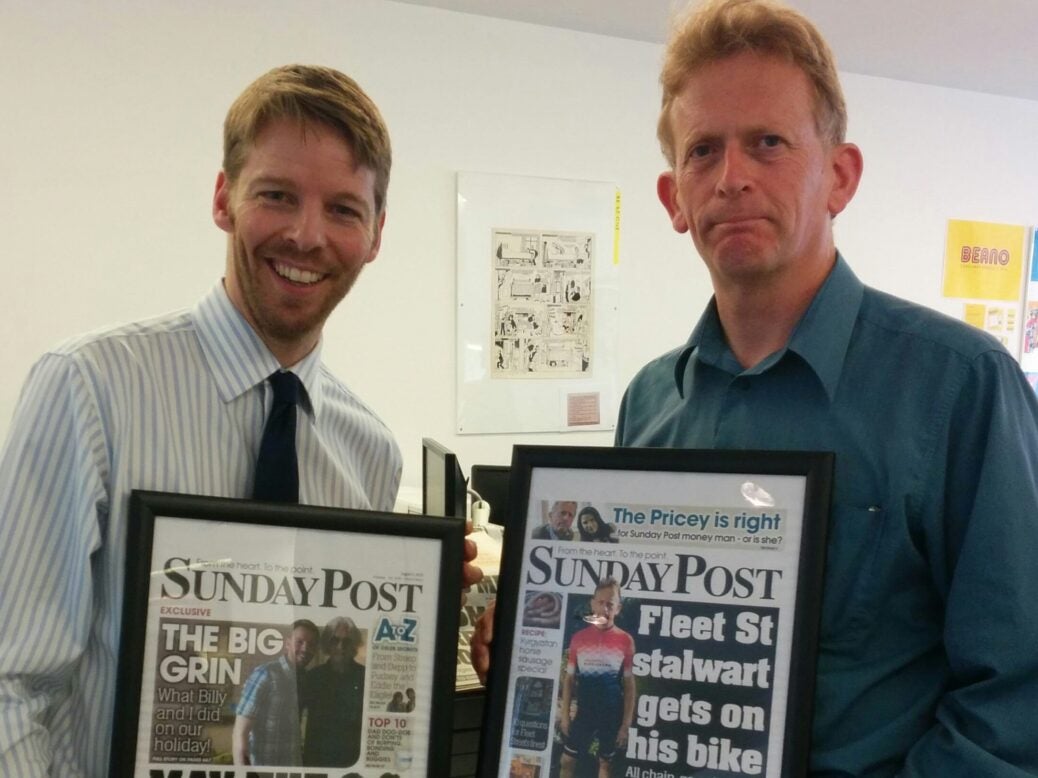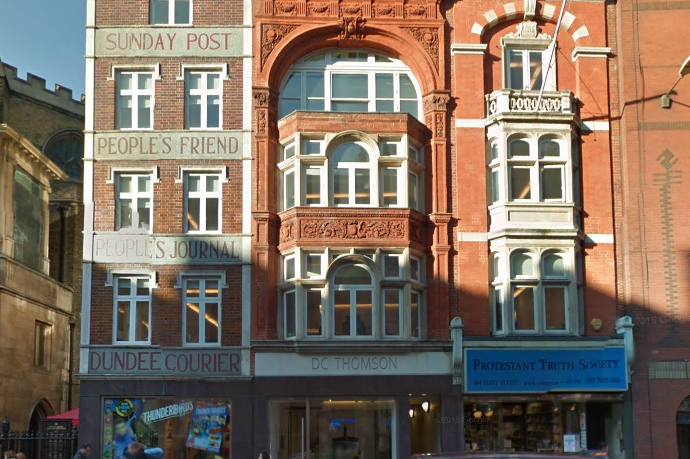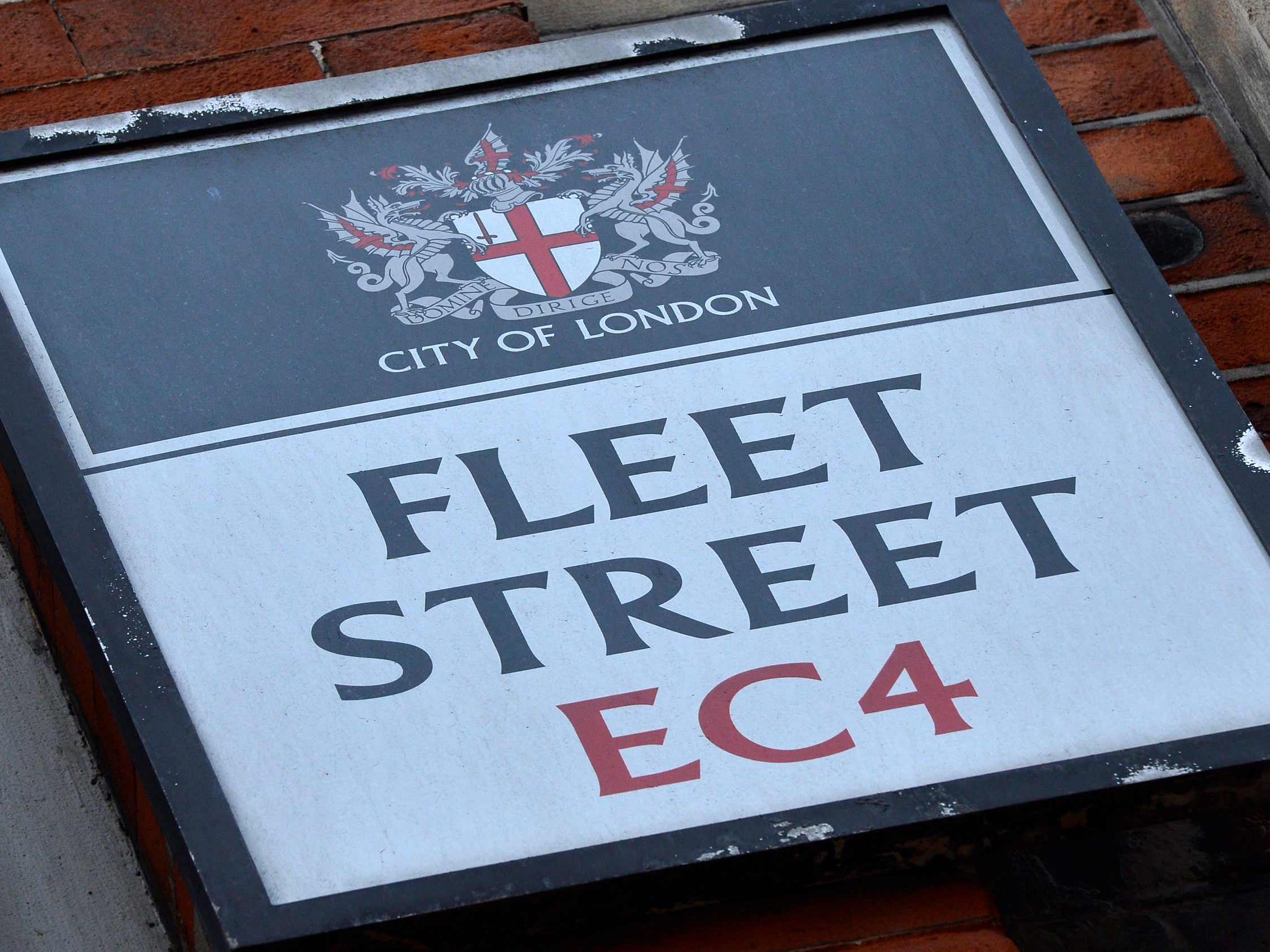
The open-air tour bus guides who tell tourists that Fleet Street, once the beating heart of the British newspaper industry, is no longer home to any newspaper journalists will be correct from today.
They can’t really be blamed for getting it wrong before, with the majority of newspapers and agencies having left the famous street some years ago.
News agency Reuters was among the last newsrooms on Fleet Street before it moved staff to new offices in Canary Wharf in 2005. Agence France Press departed a few years later in 2009.
Today, as first reported by Press Gazette last month, the last two reporters are leaving Fleet Street: Gavin Sherriff and Darryl Smith of the Dundee-based Sunday Post.
Publisher DC Thomson’s office is remaining but it will no longer house any journalists. The pair are being made redundant as fresh news and features roles are created in Scotland.
Press Gazette spoke to chief reporter Sherriff, who has spent more than thirty years on the street working for the Post, ahead of his departure.
Meeting PG at Ye Olde Cock Tavern (it may have been a sign of the changing times that both parties opted for a pint of orange and lemonade), the 54-year-old said he felt like yelling at tour guides “we are still here” as they sailed past his window and loudly announced that all the journalists had left Fleet Street.

That aside, clearly the joy of being at the nostalgic home of British journalism is something that has never quite worn off.
“Even until quite recently I thought ‘gosh, I’m a journalist and I’m walking down Fleet Street’,” he said.
“This is the place that if you mention it to any member of the public, they associate it with journalism.”
In the early years of his career he said he recalled “seeing the rolls of newsprint being taken down Bouverie Street to the Sun in the mornings” and “pubs full of journalists and printers”.
“I just enjoyed being here. Every morning you had a spring in your step. The fact that you were actually working on Fleet Street put a smile on your face in the mornings,” said the Scotland-born journalist who grew up in Kent.
“Just telling people that’s where you work still does give you a bit of a buzz.”
Sherriff, whose father was also a journalist, added: “In my twenties and thirties I could come in here any night of the week and any editorial staff from our building would have been in here.
“You didn’t need to arrange anything and if you went into any of the other pubs there would be people from other publications in there.
“Now it’s bankers and accountants, and whatever else they are, queuing outside sandwich bars.”

The first British daily newspaper, the Daily Courant, was published in Fleet Street in 1702.
The road later became synonymous with the newspaper industry – and still is today.
Despite his nostalgia, Sherriff says looking back on the past is “unhealthy” and that it’s right some workplace rituals haven’t survived through to the modern day.
“In a way it’s a shame [to see it change] but the world has to move on,” he said. “It’s just one of those things.
“It’s terrible when people say ‘it was better in my day’ – well yes in some ways it was but in some ways it wasn’t – but it’s not healthy to always keep looking back to the past. You have to learn from it.
“I get very suspicious of people who say it was better back then because I’m sure people got away with stuff that would not be tolerated today in workplace – for one the drinking culture.
“People having really long lunch breaks and coming back inebriated. Naming no names. I’m sure that was quite widespread.
“It’s a bit of a stereotype but there were people like that who went and had a long lunch then bumbled back to their desk, rang up a couple of contacts, put something together and got away with it.
“Also I remember walking in and the whole room was full of cigarette smoke. You wouldn’t be able to do that now – it would be illegal for one thing.
“I think you can have fond memories, but mourning the loss of something suggests that you think it should still be like that.”
He added he had “good memories” of his time as a reporter on Fleet Street, having covered events including the Zeebrugge ferry disaster in 1987, IRA bombings and even an assignment to say thank you to Jambo the gorilla on behalf of Sunday Post readers after the silverback protected a young boy who fell into his enclosure at Jersey Zoo.
“I came here wanting to be at the first draft of history,” said Sherrif. “You’re there at the Ministry of Defence during the First Gulf War and getting briefings and hearing things first.
“You’re there and it’s your words that record what happens and that’s a privilege.”
Other assignments included door-knocking Soham murderer Ian Huntley and speaking to him (which led to him giving evidence at the Old Bailey – “quite a daunting moment”) as well as covering the Ipswich serial murders.
He said: “When you actually knocked on doors in the street, for every person that didn’t want to talk there’s one who wanted to pour their heart out to you.
“I think that’s one of the great privileges of being a journalist: that people open up to you and share stuff about their lives that they wouldn’t share with their next-door neighbour, but you just unlock that door and it all comes out.
“It’s important to use that properly but the whole industry seems to be pulling back from that now.
“It’s clearly an industry under pressure and that’s just the way of the world really.
“You can’t fight it endlessly and you can’t turn the clock back. In the end we may pay for that but that’s one thing that’s quite pleasing about our situation.
“Personally it’s going to be a disruption but the paper is investing in staff and the company is investing in presses which they are now using to print other papers around Scotland so our company does see a future in newspapers.
“But from what I read elsewhere, others seem to be drawing back and you wonder where it’s all going to end really. Are we all going to be dependent on the BBC News app or Twitter for our news?”
He said the need for news to be reported quicker than ever means there is “less time to process and analyse it” today and that we tend to move on the next story quickly, to the point where “you’re almost forgetting what happened”.
He said journalists are “probably better trained now than they have ever been”, though today’s “pressures” meant they couldn’t devote time to stories and investigations.
Sheriff, who traded in hard news for features in the latter part of his career said: “I guess the end of Fleet Street does seem sad, but it’s quite nice to be a small footnote in the history of journalism.”
Have you worked on Fleet Street as a journalist? Share your memories by emailing freddy.mayhew@pressgazette.co.uk or calling 020 7936 6433.
Email pged@pressgazette.co.uk to point out mistakes, provide story tips or send in a letter for publication on our "Letters Page" blog

